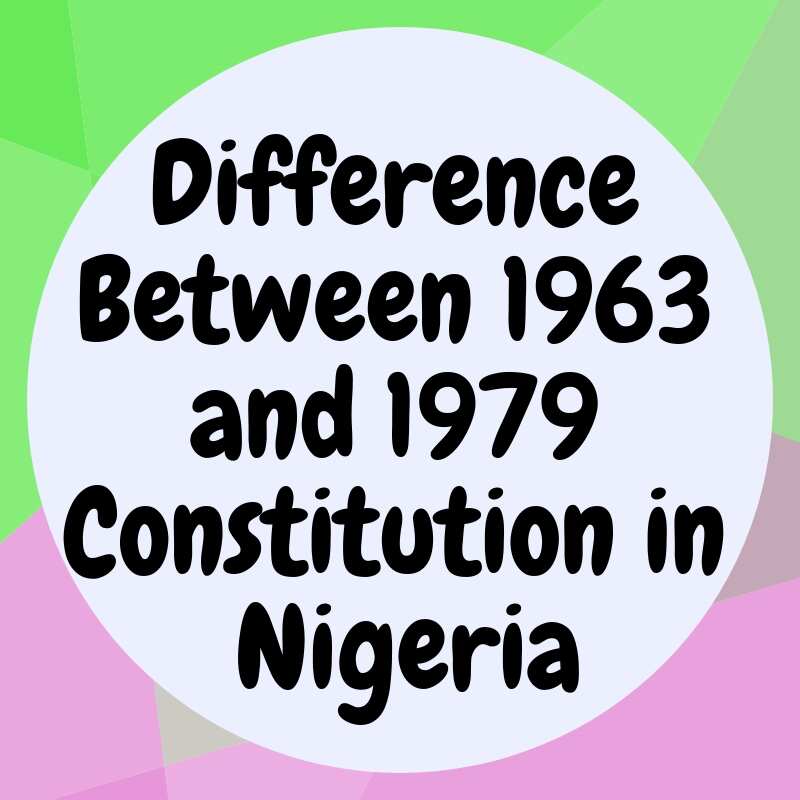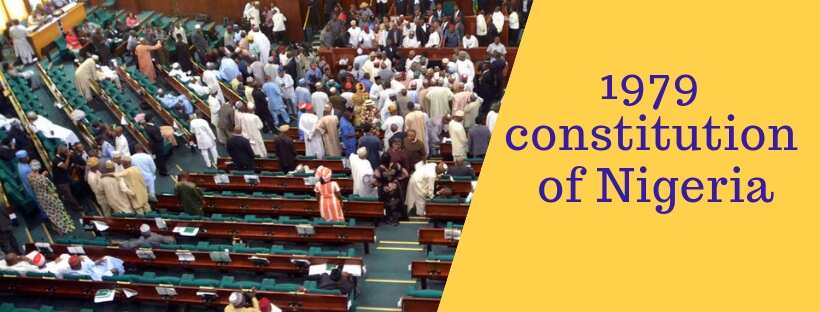A constitution is the set of fundamental laws, established to govern a country. However, this set of laws often transform. What is the main difference between 1963 and 1979 constitution in Nigeria? What urgent needs have caused the changes in the act of 1963? How many revisions did the constitution of Nigeria overcome? Read on to find out!

Constitution in Nigeria is the primary legislative power, which is built of regulative norms. They define the rights and responsibility of the people and the leaders.
Nigeria is a country, where you can observe a series of constitutions:
- 1963 constitution (First Republic)
- 1979 constitution (Second Republic)
- 1993 constitution (Third Republic)
- 1999 constitution (Fourth Republic)
What was the primary difference between 1963 and 1979 constitution?
Major differences between 1963 and 1979 constitution
Constitutional development in Nigeria can be generally divided into two epochs:
- the pre-independence or colonial period, which covered 6 constitutional instruments of 1914, 1922, 1946, 1951, 1954, and 1960;
- the post-independence epoch, including 3 constitutional instruments: 1963, 1979, and 1999.
READ ALSO: Constitutional development in Nigeria before Independence
Republican constitution of 1963

The Republican Constitution was enacted on September 19, 1963. However, it came into effect on October 1, 1963. There were many reasons to change the law of the country at the time, some of them are:
- it was high time to replaced the nominative power of the Queen of England as a head of state
- the country needed an internal transformation from a nation governed by the monarch into an independent republic
- the need for structuring and defining boundaries
- for change within the governmental organs to provide more power and responsibility for those, who represent the state
- the need for Nigeria to establish its own court of appeal and get rid of the Judicial Committee of the British Ivy Council
- theneed for increasing the number of seats in the federal legislature
READ ALSO: Importance of constitution in Nigeria
With the adoption of the Nigeria constitution of 1963, the following set of rules was defined for the country:
- The Nigerian parliament has the right to pass an the act (instead of the British parliament).
- The Nigerian president will replace the Queen of England (as the head of state).
- The president is elected by the secret ballot and can be replaced through the procedure of impeachment.
- When the president is not in the country, his power is temporarily transmitted to the parliament.
- The Supreme Court of Nigeria is the highest in the country.
- The constitution establishes and defends the fundamental human rights.
- The new law abolished the judicial advisory committee.
- The Senate should increase the number of seats from 44 to 56. The houses of representatives should be expanded from 305 to 312.
1979 constitution of Nigeria

The following primary features characterize the act of 1979:
- The Constitution is the fundamental law. All the other rules should be adjusted according to its provisions.
- Three organs of government shared the power.
- The act established the Executive President to head the state and be the commander-in-chief of the Armed Forces.
- The new law says the president to be chosen through the direct elections. He has to take votes in at least two-thirds of the states in Nigeria.
- The president should have running mates on the elections.
- One presidential can fulfill his duties on the position of the head of a state for four years and go for no more than two terms. The head of state, as well as his “mates”, could be replaced from the organs of government through the procedure of impeachment.
- According to the new act, the state should establish the national economic council, which will be headed by the Vice-president in cooperation with the governor of the central bank and all state governors.

Photo: thecleanvibes.com
4 major differences between the constitution of 1963 and 1979:
- The constitution of 1963 used the British Parliamentary or Cabinet System. The act of 1979 adopted the American Presidential system (the Washington Model).
- Due to the constitution of 1963, the responsibility to head the state and be its official commander of the Armed Forces was laid on the Ceremonial President. The act of 1979 ensured the same functions for the Executive President.
- According to the act of 1963, the president was elected by the houses of Parliament, while its “edited version” of 1979 mentioned that the head of the state would be chosen on a general election.
- The first act of 1963 provided close relationships for the legislative and the executive powers. The later act of 1979 drew a clear boundary between them and divided their fields of powers.
As you can see, the changes put into the main legislative instrument of Nigeria were a necessary step towards better governance, control, and defending human rights within society.
READ ALSO: Fundamental duties of a citizen in Nigeria by the Constitution
Source: Legit.ng
from Nigeria News today & Breaking Naija news ▷ Read on LEGIT.NG 24/7 http://bit.ly/2Q7IXtX
via EDUPEDIA24/7
Comments
Post a Comment